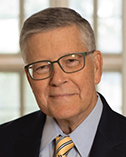
Henry L. Roediger, III
Washington University in St. Louis
|
Primary Section: 52, Psychological and Cognitive Sciences Membership Type:
Member
(elected 2017)
|
Biosketch
Henry L. Roediger, III is a cognitive psychologist recognized for his work on human learning and memory. He is known for developing techniques to study false memories, the power of retrieval practice in enhancing learning and retention, and a theory to explain differences observed between explicit and implicit memory tests. Roediger was raised in Danville, Virginia. He attended Riverside Military Academy for high school and then Washington & Lee University, majoring in psychology. He received his PhD from Yale University in 1973 and taught at Purdue University, the University of Toronto and Rice University prior to his current position at Washington University. Roediger has served as President of the Association for Psychological Science and several other organizations of psychologists. He received the William James Lifetime Achievement Award from APS, as well as the association's Lifetime Mentoring Award. He also received the Howard Crosby Warren Medal from the Society of Experimental Psychologists, a John P. Guggenheim Fellowship, the John P. McGovern Award from the American Association for the Advancement of Science, and a Doctor of Social Sciences, honoris causa, from Purdue University. Roediger is a member of the American Academy of Arts and Science and the National Academy of Sciences.
Research Interests
Henry Roediger's research is concerned with several broad topics concerning human memory. One thrust of his work concerns the power of retrieval practice as a memory enhancer, producing greater learning than other study strategies. This research has been extended into educational practice. Roediger has also developed a straightforward technique to induce false memories in laboratory settings, and this paradigm has been widely used to study illusory memories. An earlier program of research involved experiments elucidating the relation between explicit and implicit memory tests, and he is known for advancing the theoretical approach of transfer appropriate processing to account for differences among tests. Two more recent research interests currently being pursued are the study of people with extraordinary memory abilities and the study of collective (or historical) memory. The former involves cognitive assessment of people who have developed great abilities in remembering (e.g., contestants in memory tournaments, people who memorize large parts of the Bible, among others) to determine if they have cognitive abilities in common. The latter topic is concerned with how people in groups remember, such as how Americans remember events of World War II or other historical milestones, and how these memories shape political discourse.

